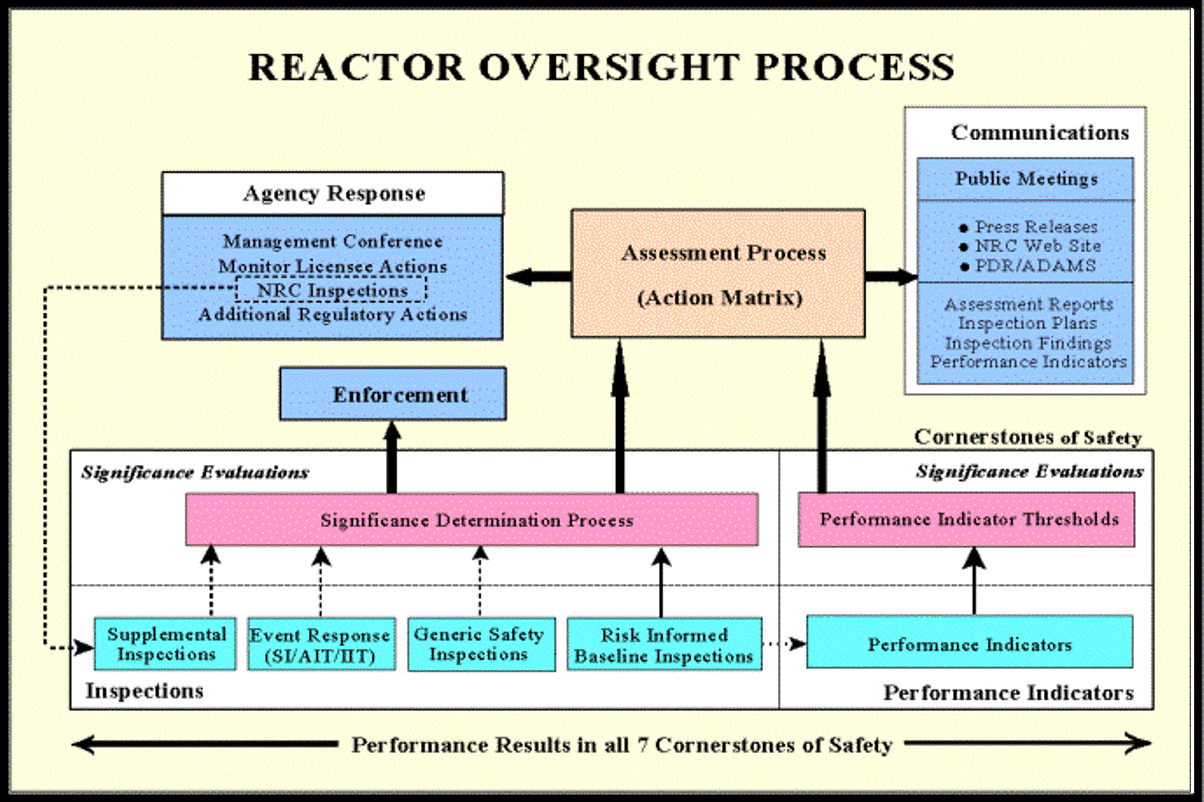Nuclear Energy Activist Toolkit #39
The Nuclear Regulatory Commission’s (NRC’s) nuclear safety oversight efforts consist of three elements: inspection, assessment, and enforcement. Most of the time, findings by NRC’s inspectors and/or adverse trends from performance indicators result in the agency taking enforcement action in the form of supplemental inspections. In other words, more NRC inspectors arrive at the nuclear plant to determine whether the original problems have been properly fixed and whether additional problems exist.
 Problems sometimes appear to have suspicious causes. The investigators in the NRC’s Office of Investigations (OI)—nuclear cops carrying badges and authorized to also carry guns and handcuffs—are trained to distinguish between honest mistakes and dishonest acts. The average OI investigator has 19 years of federal law enforcement experience, experience that gets put to good use in determining whether willfulness or deliberate misconduct factored in the problems. OI’s jurisdiction covers allegations of wrong-doing by NRC’s licensees as well as by their contractors and vendors. (The Office of the Inspector General (OIG) has responsibility over allegations of wrong-doing by NRC employees.)
Problems sometimes appear to have suspicious causes. The investigators in the NRC’s Office of Investigations (OI)—nuclear cops carrying badges and authorized to also carry guns and handcuffs—are trained to distinguish between honest mistakes and dishonest acts. The average OI investigator has 19 years of federal law enforcement experience, experience that gets put to good use in determining whether willfulness or deliberate misconduct factored in the problems. OI’s jurisdiction covers allegations of wrong-doing by NRC’s licensees as well as by their contractors and vendors. (The Office of the Inspector General (OIG) has responsibility over allegations of wrong-doing by NRC employees.)
Over the past five years, OI has investigated slightly over 190 cases annually as shown in the annual reports issued by OI. The significant findings made by OI investigators over the past two years include:
- The Chemistry Manager at Indian Point (NY) deliberately falsified the test results from samples drawn of the diesel fuel oil for the emergency diesel generators.
- A Fire Protection Coordinator at Kewaunee (WI) willfully failed to conduct fire drills between 2006 and 2011 and falsified the fire drill evaluation and critique forms to indicate the drill had been performed.
- An engineering supervisor at Wolf Creek (KS) willfully falsified records to indicate that inspections of the spent fuel pool area for foreign material (i.e., loose objects that could fall into the pool and damage irradiated fuel) had been performed on a monthly basis when no inspections were actually conducted.
- Four security officers at Arkansas Nuclear One (AR) were deliberately inattentive while on duty as armed responders.
- The Condenser Replacement Project Superintendent at the Columbia Generating Station (WA) submitted synthetic urine during a random fitness for duty examination.
- An electrician and an electrical foreman at Watts Bar (TN) deliberately falsified paperwork to indicate the completion of post-installation checks after electrical cables had been routed and connected when the checks had not been performed.
Bottom Line
OI performs a vital role in the NRC’s nuclear safety oversight efforts. Its investigators are trained to determine whether a problem had an innocent explanation or a more nefarious cause. This distinction is important, even when the majority of OI’s investigations conclude that the alleged wrong-doing is unsubstantiated. The NRC’s inspectors—who lack formal training and experience in investigator techniques—rely in large part on interviews of plant workers and audits of paperwork prepared by plant workers. The inspection process assumes that information obtained by NRC inspectors is accurate. OI supports this assumption by determining whether suspicious information can be relied upon.
OI’s role is not one that can be delegated to plant owners. The NRC prides itself on being an independent regulator. It cannot be independent when it largely relies on audits of information supplied by plant workers and exclusively relies on plant owners as to whether that information is complete and accurate.
The metric described in the annual OI reports for monitoring its effectiveness is impressive. Instead of using arrests or convictions or similar statistics, OI emphasized getting to an answer (95% of the cases in 2013) in a timely manner (96% of assists to NRC staff closed within 90 days). Even though authorized to carry guns and handcuffs, the OI investigators’ job is not to put every person of interest in prison. Their job is to get to the truth as expeditiously as possible. The annual reports indicate a focus on this proper outcome.
The UCS Nuclear Energy Activist Toolkit (NEAT) is a series of post intended to help citizens understand nuclear technology and the Nuclear Regulatory Commission’s processes for overseeing nuclear plant safety.


